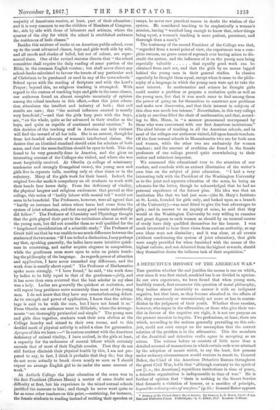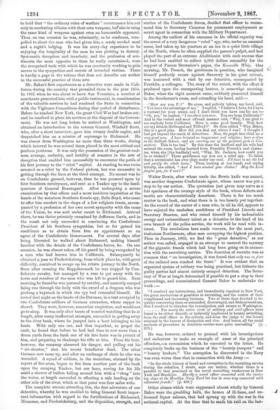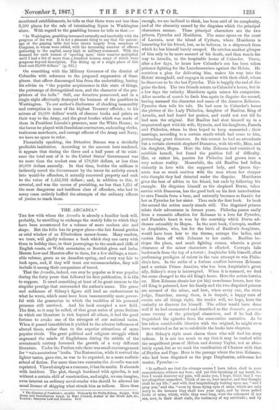A DETECTIVE'S HISTORY OF THE AMERICAN WAR.*
THE question whether the end justifies the means is one on which, ever since it was first stated, mankind has b.!en divided in opinion. In our own experience, we have found that when young men, healthily reared, first encounter this question of moral philosophy, they incline almost invariably to answer it with an indignantr negative, but that later, as they become absorbed in the affairs of life, they consciously or unconsciously act more or less in contra- diction to the judgment of their youth. Whether those casuists, however, who argue in the affirmative, or those who give their ver- dict in favour of the negative are right, it is not our purpose on the present occasion to inquire. Two professions, at least, there are which, according to the notions generally prevailing on this sub- ject, could not exist except on the assumption that the correct solution of the problem is in the affirmative. This the members of the Jesuitical and detective crafts agree in accepting as an axiom. The volume before us consists of little more than a detailed account of transactions in which certain ends were attained., by the adoption of means which, to say the least, few persons- under ordinary circumstances would venture to resort to. General Baker, the Chief of the American Detective Bureau throughout the great Civil War, holds that "although contrary to the spirit of our [i. e., the American] republican institutions in time of peace,. a detective organization is indispensable in time of war." He is further of opinion that "there is nothing in the Secret Service- that demands a violation of honour, or a sacrifice of principle,. beyond the ordinary rules of warfare." (p.34.) General Baker appears * History of the United States' Secret Service. By General L. C. Baker, Chief of Um National Detective Pollee. P141a4o151,h.; L. C. Baker, 1847. Laudon: Trabner.
to hold that "the ordinary rules of warfare " countenance him not only in combating villains with their own weapons, but also in using the same kind of weapons against even an honourable opponent. Thus, on one occasion he was, reluctantly, as he confesses, com- pelled to shoot the man who had given him a sorely needed meal and a night's lodging. It was his every-day experience to be enjoying the hospitality of the men he was plotting to destroy. Systematic deception and treachery, and the profession of sen- timents the most opposite to those he really entertained, were the recognized tools with which he was constantly working to gain access to the sympathies and secrets of intended victims. There is hardly a page in the volume that does not describe our author in the successful practice of these arts.
Mr. Baker's first experiences as a detective were made in Cali- iomia during the anarchy that prevailed there in the year 1854. In 1861 when he was about to leave San Francisco, a number of merchants presented him with a public testimonial, in consideration of the valuable services he had rendered the State in connection -with the Vigilance Committees during that period of disturbance. Before he reached New York, the great Civil War had broken out ; and he resolved to place his services at the disposal of the Govern- ment. He was not long before he arrived at Washington, and -obtained an introduction to the veteran General, Winfield Scott, who, after a short interview, gave him twenty double eagles, and -despatched him on a mission of espionage to Richmond. He was absent from Washington no more than three weeks, during -which interval he was several times placed in the most critical and perilous positions. It was only the possession of the greatest cool- ness, courage, audacity, and fertility of resource in the arts of -deception that enabled him successfully to encounter the perils of his first journey to the " rebel " capital. At starting he was twice -arrested as a rebel by the Federal pickets, but was successful in getting through the lines at the third attempt. No sooner was he -on Confederate ground, however, than he was pounced upon by four Southern cavalrymen, and sent as a Yankee spy to the head- -quarters of General Beauregard. After undergoing a severe examination by that officer and a more insidious inquisition at the hands of the notorious Southern female spy, Belle Boyd, who came to offer him comfort in the shape of a few religious tracts, accom- panied by a profession of her own secret sympathy with the cause of the Union, he was sent under escort to Richmond. Arrived there, he was thrice privately examined by Jefferson Davis, and in the result not only succeeded in convincing the Confederate President of his Southern sympathies, but so far gained his confidence as to obtain from him an appointment as an agent of the Confederate Government. For several days after being liberated he walked about Richmond, making himself familiar with the details of the Confederate forces, &c. On one -occasion, he was almost taken off his guard by being recognized by a man who had known him in California. Subsequently he obtained a pass to Fredericksburg, from which place he, with great -difficulty, contrived to escape on his return journey to the North. Soon after crossing the Rappahannock he was stopped by Con- federate cavalry, but managed by a ruse to get away with the • horse and revolver of the man who was left to guard him. Next morning he found he was pursued by cavalry, and narrowly escaped being run through the body with the sword of a dragoon who was probing a haystack in which the spy had concealed himself. He rested that night on the banks of the Potomac, in a tent occupied by two Confederate soldiers of German extraction, whose supper he shared. They were, however, somewhat suspicious, and would not go to sleep. It was only after hours of wearied watching that he at length, after many ineffectual attempts, succeeded in getting away to the river bank, where he jumped into a boat belonging to his hosts. With only one oar, and that imperfect, to propel the -craft, he found that before he had had time to row more than a dozen yards from the bank one of his late hosts was in pursuit of him, and preparing to discharge his rifle at him. From his boat, however, the runaway observed his danger, and pulling out his " six-shooter," shot his recent benefactor dead. The other German now came up, and after an exchange of shots he also was wounded. A squad of soldiers, in the meantime, alarmed by the report of fire-arms, began to fire from another part of the bank -upon the escaping Yankee, but our hero, rowing for his life amid a shower of bullets falling arouud him with a "chug " into the water, at length succeeded in effecting a safe landing on the -other side of the river, which at that point was four miles wide.
The complete success attending this, the first adventure of our -detective, whereby he was enabled to bring General Scott impor- tant information with regard to the fortifications of Richmond, _Manassas, and Fredericksburg, and the disposition, strength, and station of the Confederate forces, decided that officer to recom- mend him to Secretary Cameron for permanent employment as secret agent in connection with the Military Department.
Among the earliest of his successes in his official capacity was the arrest of a very dangerous " rebel " spy, who, under an assumed name, had taken up his quarters at an inn in a quiet little village of the North, where he often supplied the parson's pulpit, and had played the part of an extreme Abolitionist with such success that
he had been enabled to collect 4,000 dollars ostensibly for the support of Parson Brownlow's paper, the Knoxville Whig. One morning, Mr. French, the gentleman in question, who imagined himself perfectly secure against discovery in his quiet retreat, was honoured with a visit by our detective, accompanied by
Franklin, a colleague. The story of the arrest, with the effect it produced upon the unsuspecting hostess, is somewhat amusing. Baker, when the right moment came, suddenly presented himself in the Southerner's room, and extending his hand, said
How are you, F. ?" He arose, and politely taking my hand, said, "You have the advantage of me." I replied, "I believe I have, for I have a warrant for your arrest, and I don't think you have one for me.'— " Oh, yes," he replied, "I recollect you now. You are front California ?" And in the coolest and most offhand manner said, "Why, I am glad to see anybody from California. Here is some good brandy. Well, how are my friends McDougal and Tillford ?" • He then added, "Why, Baker, this is a good joke. How did you find out where I was ? I thought I had got beyond the reach of detectives. Now, the people here think me a very good man. I have lectured on temperance and religion ; have a class in the Sabbath School; and am courting one of the prettiest girls in Con- necticut. This is too bad." By this time the landlord and his wife had entered the room, having learned from Franklin French's real charac- ter, when she [the landlady] said, "Why, Mr. Jaekson, how could you be so wicked ? These gentlemen say you are a rebel spy. To think that a secessionist has ever slept under our roof. l'll have to air the bed and purify the whole house." Then- looking at her hands and crying bitterly, she added, "And I have Washed your clothes May the Lord forgive you, far I can't !"
Walter Bowie, after whose uncle the Bowie knife was named, was another desperate Confederate agent, whose career was put a stop to by our author. The quotation just given may serve as a fair specimen of the average style of the book, whose defects and merits are characteristically American. There is far too much matter in the book, and what there is is too loosely put together.
As the record of the career of a man who, in all he did, appears to have enjoyed the unshaken confidence of President Lincoln and Secretary Stanton, and who raised himself by his indomitable energy and extraordinary talent as a detective to the head of his own branch of the police service, the work will be read with in- terest. The revelations here made concern, for the most part, traitorous Northerners, often men occupying the highest position.
Thus in January, 1865, we find the "great detective," as our author was called, engaged in an attempt to unravel the mystery of the gigantic frauds which had long been going on in connec- tion with the recruiting service. The desertion of recruits was so common that "on investigation, it was found that only one an four
of the enlisted men reached the front." It was evident that an organized system of robbery was being practised, but hitherto the guilty parties had almost entirely escaped detection. The Secre- tary of War at length determined if possible to put a stop to their proceedings, and commissioned General Baker to undertake the work
I received my instructions, and immediately repaired to New York, the great rendezvous of gamblers in recruiting, and the centre of their complicated and increasing business. Two or three days devoted to in- quiries concerning them so astounded, discouraged, and disheartened me, that I resolved to abandon the investigation and return to Washington.
For nearly the entire circle of military and civil officers were found to be either directly or indirectly implicated in bounty swindling, from the staff officer to the orderly, and from the judge to the lowest criminal in the haunts of dissipation and vice. And hence, all the usual methods of procedure in detective service were quite unavailing." (p. 379.)
He was, however, ordered to proceed with his investigations and endeavour to make an example of some of the principal offenders,—a commission which he executed to the letter. He completely broke up the business of the " bounty-jumpers " and "bounty brokers."- The corruption he discovered in the Navy was even worse than that in connection with the Army:—
" In the whole history of fraud and corruption in the recruiting service during the rebellion, I doubt, says our author, whether there is a parallel to that practised at the naval recruiting rendezvous in New York and Brooklyn. Hardly a naval officer connected with the receiv- ing ships at the Brooklyn Navy Yard but was in some way connected with enlistment frauds." (p. 408.)
Other abuses which were suppressed almost wholly by General Baker were the gambling hells, the houses of ill-fame, and un- licensed liquor saloons, that had sprung up with the war in the national capital. At the time that he made his raid on the last- mentioned establishments, he tells us that there were not less than 3,500 places for the sale of intoxicating liquor in Washington alone. With regard to the gambling houses he tells us that :—
" In Washington, gambling increased naturally and inevitably with the progress of the war. It is not a pleasant thing to say that the patron- age of the gaming table had been drawn largely from members of Oongrees, to whom were added, with the increasing number of officers gathering to the capital, many high in military command. With the demand for such haunts of sporting men,' their number multiplied until I had a list of more than a hundred houses, many of which were gorgeous beyond description. The fitting up of a single place of this kind cost 25,000 dollars." (p. 211.)
On consulting with the Military Governor of the district of Columbia with reference to the proposed suppression of these places, that officer discouraged him from the undertaking, basing his advice on "the popular acquiescence in this state of things, the patronage of distinguished men, and the character of the pro- prietors of the hells." Still, our detective persevered, and in a single night effectually destroyed the business of the gamblers in Washington. To our author's disclosures of shocking immorality and corruption in some of the highest Treasury officials ; to his seizure of 20,000 dollars' worth of obscene books and prints on their way to the Army, and the great bonfire which was made of them in President Lincoln's presence, near the White House ; to the havoc he played with fraudulent contractors, embezzling clerks, traitorous merchants, and corrupt officers of the Army and Navy, we have no space to refer.
Financially speaking, the Detective Bureau was a decidedly
profitable institution. According to the account here rendered, it appears that during the three and a half years of its -exist-
ence the total cost of it to the United States' Government was no more than the modest sum of 170,920 dollars, or less than -50,000 dollars annually. In that time, besides the millions it indirectly saved the Government by the terror its activity struck into would-be offenders, it actually recovered property and cash to the value of 1,453,932 dollars ; and, in addition to this, it arrested, and was the means of punishing, no less than 1,254 of the most dangerous and insidious class of offenders, who had in many cases entirely baffled the attempts of the ordinary officers of justice to reach them.
































 Previous page
Previous page